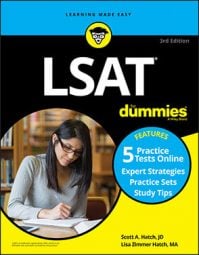Many strengthen/weaken questions on the LSAT don’t ask for the choice that best strengthens (or weakens, or supports, or undermines) the argument but instead for the one choice that doesn’t do one of those things. These questions end in the extremely important word EXCEPT. It’s always capitalized, so you can’t miss it.
These questions look like this:
Each of the following, if true, supports the argument above EXCEPT:
Each of the following, if true, would weaken the commentator’s argument EXCEPT:
Each of the following, if true, supports the physicist’s hypothesis EXCEPT:
Each of the following, if true, weakens the argument EXCEPT:
Each of the following, if true, strengthens the argument EXCEPT:
They can also look like this:
Which one of the following, if all of them are true, is LEAST helpful in establishing that the conclusion above is properly drawn?
Which one of the following, if all of them are true, is LEAST effective at undermining the politician’s argument?
They’re still strengthen/weaken questions, but instead of finding one answer to strengthen/weaken/support/undermine, you want to find four.
As always, first read the question carefully. These questions aren’t your standard strengthen/weaken questions. Instead, they offer four choices that do strengthen or weaken the conclusion, and one that doesn’t. You don’t necessarily have to find an answer that strengthens or weakens the conclusion; you just want an answer that doesn’t do what the other four do.
For example, if the question reads “Each of the following, if true, weakens the argument EXCEPT:” the correct answer doesn’t necessarily strengthen the argument, but it definitely doesn’t weaken it.
Here’s an example of a question that has four answers that weaken the argument and one that doesn’t:
Some workers in microwave popcorn factories have contracted a rare lung disease. Experts have linked this disease to a chemical used in the process of mixing popcorn and flavorings. Consumers should, therefore, stop buying and eating all types of microwave popcorn to avoid the risk of contracting this lung disease.
Each of the following, if true, weakens the argument EXCEPT:
(A)The lung disease is caused by being exposed to the chemical for many hours at a time over a period of years.
(B)The chemical only becomes toxic when it is held at a temperature much higher than that reached by popcorn in a microwave.
(C)The lung disease has only been found in workers who handled the Cajun Spice flavor of popcorn.
(D)In 20 years of widespread microwave popcorn consumption, no consumer has ever contracted this rare lung disease.
(E)The EPA has not yet done any research to determine whether the chemical that causes the lung disease is present in the steam and air that come out of a bag of popcorn when it is opened.
From reading the question first, you know you want an answer that doesn’t weaken the argument. The conclusion is that consumers should stop eating all types of microwave popcorn to avoid catching a disease. The evidence for this conclusion is that a chemical in microwave popcorn caused this disease in popcorn factory employees.
What weakens the argument? Any evidence that makes consumers seem safe. If you can prove that the disease is somehow restricted to the factory workers, you can reassure consumers that they can eat microwave popcorn with impunity. What doesn’t weaken the conclusion? Any evidence indicating that consumers can catch the disease from eating microwave popcorn, or any evidence that’s of unclear relevance or simply off-topic.
Choice (A) weakens the argument because most consumers aren’t exposed to the chemical in question for long periods of time.
Choice (B) weakens the argument because consumers aren’t keeping their popcorn hot enough.
Choice (C) weakens the suggestion that consumers should avoid all kinds of microwave popcorn, though possibly not the suggestion that they should avoid Cajun Spice flavor.
Choice (D) weakens the suggestion because it makes the risk to consumers appear almost negligible.
Choice (E) doesn’t weaken the argument; if the EPA hasn’t yet done any research into the chemical’s presence in popcorn steam, then the chemical could well be lurking in there, ready to sicken hapless consumers.
Choice (E) doesn’t especially strengthen the argument, but it doesn’t weaken it, either. Choice (E) is the correct answer.

